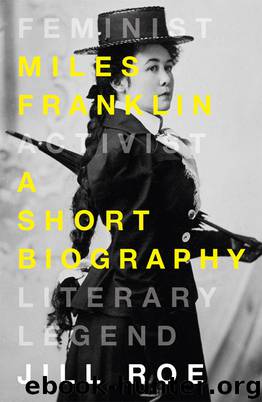Miles Franklin by Jill Roe

Author:Jill Roe
Language: eng
Format: epub
Publisher: HarperCollins Publishers
Published: 2018-03-14T04:00:00+00:00
12
MAINTAINING OUR BEST TRADITIONS: 1939‒1945
Culture will survive war.1
On the evening of Sunday 3 September 1939, walking along Pitt Street with Louis Esson after a reading of Leslie Rees’ play Lalor of Eureka by the New Theatre League, Miles Franklin saw a late news poster declaring that Britain and France were at war with Germany. At first she assumed that it was ‘the same old war’, but well before the supposedly impregnable British naval base at Singapore fell to the Japanese on 15 February 1942, she understood that it was a ‘new war’. The ‘new war’ for Australians, the war in the Pacific, lasted until the Japanese surrender on 15 August 1945. It was to be a long war. Reluctantly at first, but with increasing clarity of mind following the Battle of Britain in the northern summer of 1940 and dissociation from the Australia First movement thereafter, Miles rose to the occasion. She was too old to sign up as a cook again, but still resolute against armchair warriors. This time she found her métier in what she described as ‘maintaining our best traditions’. Indeed, the Furphy project ensured she was well placed to perceive the relationship between culture and society at a time of total war.2
Like most thoughtful people, Miles had long been anxious about the war clouds gathering over Europe. She hung on to her pacificist views as long as she could. Letters written in 1939, particularly to the Fullerton– Singleton household in London, show her to have been on the one hand deeply mistrustful of the appeasers, and on the other, resolutely antiwar. She thought, rightly, that the British governing classes feared Russia more than Germany: ‘The only ally for England is Russia but the British Fascists and their hankerers like Chamberlain and all that privileged crowd would rather risk losing all than giving in to the possibility of such an experiment in democracy.’ She was therefore ‘more than thankful’ for Virginia Woolf’s Three Guineas, which showed, she averred, that Charlotte Perkins Gilman was right, that war was the madness of men.3
Download
This site does not store any files on its server. We only index and link to content provided by other sites. Please contact the content providers to delete copyright contents if any and email us, we'll remove relevant links or contents immediately.
| Africa | Americas |
| Arctic & Antarctica | Asia |
| Australia & Oceania | Europe |
| Middle East | Russia |
| United States | World |
| Ancient Civilizations | Military |
| Historical Study & Educational Resources |
Cecilia; Or, Memoirs of an Heiress — Volume 1 by Fanny Burney(32536)
Cecilia; Or, Memoirs of an Heiress — Volume 2 by Fanny Burney(31933)
Cecilia; Or, Memoirs of an Heiress — Volume 3 by Fanny Burney(31925)
The Secret History by Donna Tartt(19017)
Sapiens: A Brief History of Humankind by Yuval Noah Harari(14356)
Leonardo da Vinci by Walter Isaacson(13303)
The Radium Girls by Kate Moore(12011)
Sapiens by Yuval Noah Harari(5358)
How Democracies Die by Steven Levitsky & Daniel Ziblatt(5207)
The Wind in My Hair by Masih Alinejad(5084)
Homo Deus: A Brief History of Tomorrow by Yuval Noah Harari(4894)
Endurance: Shackleton's Incredible Voyage by Alfred Lansing(4749)
Man's Search for Meaning by Viktor Frankl(4564)
The Silk Roads by Peter Frankopan(4520)
Millionaire: The Philanderer, Gambler, and Duelist Who Invented Modern Finance by Janet Gleeson(4456)
The Rape of Nanking by Iris Chang(4193)
Joan of Arc by Mary Gordon(4090)
The Motorcycle Diaries by Ernesto Che Guevara(4080)
Stalin by Stephen Kotkin(3949)
